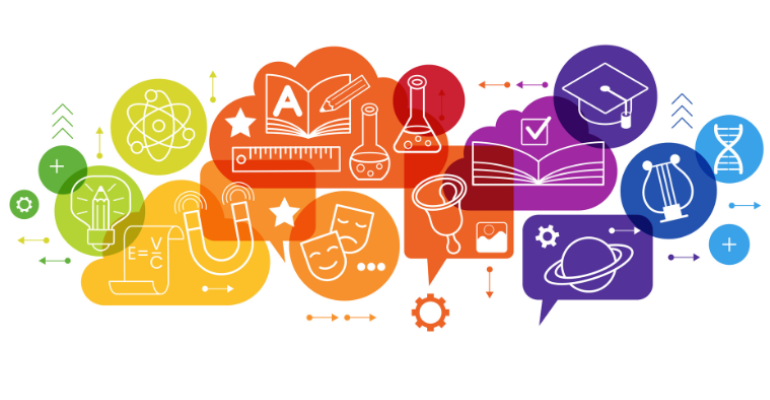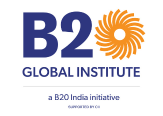Policy Brief
Thematic Area: Capability Building, Skilling & Mobility

A Look at the Issue Note of Education Working Group of G20 South Africa
G20 & B20 Action on Education
Education has been a top priority for the G20 and the G20 has played a critical role in shaping the future of education by undertaking actions on addressing challenges and fostering global cooperation on education related initiatives.
The G20 Education Working Group (EdWG) was established in 2018, during the Argentinian Presidency. The EdWG was thereafter included by all subsequent presidencies as a permanent working group of the Sherpa track.
The disruptions arising from the Covid-19 pandemic coupled with the advent of advanced and modern technologies completely transformed the work landscape and the future of work, leading to significant challenges. The G20 has worked on addressing wide-ranging challenges including strengthening technological tools, digitalization and digital technologies in education, learning outcomes, equitable access, partnerships for education, global cooperation, and education for sustainable development, among many others.
The South African Presidency will build upon the achievements of India and Brazil and take forward the development agenda on education.
B20 as the Business Engagement Group of the G20 has also taken forward the agenda of employment and education as a critical priority through its consecutive presidencies. The B20 taskforces on education and employment have engaged in continuous workforce development issues and from time to time have suggested policy actions to enhance learning programs while improving workforce skills.
G20 South Africa: Issue Note of Education Working Group
The note stresses on the importance of education in fostering global prosperity, equity and sustainable development and lays down the critical priorities of the 2025 G20 EdWG. The importance of education systems in G20 countries in promoting global peace and development is also highlighted.
The note underlines the increasing income and wealth inequalities in recent years as a major reason behind the unequal digital access at present. In this context, it emphasises the need for deeper understanding of digital technologies, promoting learning and primary education, and fostering gender equality as critical imperatives for enhancing inclusive and equitable growth.
As less developed regions of the world, including parts of Africa face significant threats from the impacts of climate change, especially those relating to food security and poverty, a strong focus is placed on fostering climate change education for building greater resilience to climate threats.
Reflecting on current global challenges, the 2025 EdWG identified the sub-theme of “Educational Professionals for Solidarity, Equality, Sustainability”, with a focus on building South-South cooperation and addressing the challenges and priorities in Africa. The group identified the following three priorities in this context –
- Quality Functional Learning: The role of early childhood care and education (ECCE) to improve the quality of foundational learning
- Education professional development for a changing world
- Mutual recognition of qualifications in a global context
Priority 1: Quality Functional Learning: The role of early childhood care and education (ECCE) to improve the quality of foundational learning
Foundational learning involves basic literacy, numeracy, and socio-emotional skills and plays a critical role in the early years of education, while also strongly influencing later learning, especially higher education.
Quality early childhood care and education (ECCE) programmes in this context, play important roles in establishing social equity and promoting gender equality, while contributing to higher competency levels.
However, many low- and middle-income economies continue to face significant challenges in accessing quality pre-primary education, with insufficient pre-primary teachers and inadequate regulation as major obstacles. Low and sporadic expenditure in teacher training, minimal state oversight along with lower wages and poor working conditions are other challenges faced by many developing countries.
Key areas of focus highlighted by EdWG
- A fit-for-purpose articulation between minimum qualifications for ECCE teachers, high quality pre-service training and innovation in the in-service training and development of ECCE teachers
- The development and implementation of quality assurance initiatives in ECCE programmes
- Frameworks for parenting support programmes
- Fostering collaboration with stakeholders in developing a capable, professional workforce
- Innovative, sustainable parenting support programmes
Addressing these issues is essential to unlock the full potential of pre-primary programmes and improving learning outcomes. Comprehensive planning and implementation of pre-primary programmes, designing a well-aligned curriculum, adequately trained teachers, sufficient funding, and robust quality assurance mechanisms along with engaging families and communities are crucial for ensuring the effectiveness of pre-primary education programmes.
Priority 2: Education and Professional Development for a Changing World
The Covid-19 pandemic highlighted the need for developing 21 st century skills in areas such as digital literacy, critical thinking, collaboration and problem solving. In addition, the fast-changing work landscape necessitated the need for developing competencies in social, emotional and cognitive skills for fostering innovation and entrepreneurship.
In this context, addressing teacher shortages and retaining teachers has become crucial for developing such skills and improving professional development.
Key areas of focus highlighted by EdWG
- Practices of countries with respect to teacher retention, efficacy, and autonomy in ITE and in-service training
- The challenges of teacher retention and strategies for enhancement.
- The impact of new teacher induction, orientation, and mentoring programmes in mitigating attrition
- Key strategies for enhancing teacher retention and efficacy
- Insights and best practices on integrating 21st-century skills into teacher education and showcasing innovative practices for upskilling teachers
- Integrating 21st-century skills into teacher education programmes
As per UNESCO’s 2024 Global Report on Teachers, 44 million additional primary and secondary teachers are required globally to achieve universal education with Sub-Saharan Africa requiring an additional 15 million. With the teacher attrition rate doubling globally from 4.62% to 9.06% between 2015 and 2022, addressing teacher attrition has become essential for meeting the 2030 teacher supply targets. A strong focus similarly needs to be placed on teacher retention.
Limited financial resources in the African Union countries is a significant deterrent to professional development programmes. The Working Group underscores the need to devise effective mechanisms for establishing robust professional development programmes in countries with fiscal limitations in this regard.
Priority 3: Mutual Recognition of Qualifications in a Global Context
The G20 Ministers in 2020 highlighted the value of fostering internationalization in education as a means of improving the quality of education at all levels. As this encompasses global dimensions in education along with student and staff mobility and collaborations in international research, a strong focus has been placed by the EdWG on the recognition of qualifications.
Over the last few years, the globalization of education, the growth in online learning, and increasing international mobility of teachers along with other factors such as the shift towards recognizing skills and competencies rather than just formal education, among others, have contributed to greater global mobility of people.
While some countries have successfully created appropriate qualifications and structures for enhancing global mobility of teachers, the complexity of replicating best practices in different contexts is a significant challenge. Therefore, the EdWG has emphasized the importance of exploring global trends for recognition of qualifications across borders.
Key areas of focus highlighted by EdWG
- Understanding qualifications and quality assurance regimes in different countries and current realities and challenges with respect to recognition of foreign qualifications
- Exploring possible mechanisms for mutual recognition of qualifications and skills, including micro-credentials
- Exploring enabling mechanisms, global and regional conventions, and continental qualifications frameworks and networks
- Exploring innovative approaches to micro credentials for lifelong learning and employability
Conclusion
Education is a critical determinant of inclusive economic growth. By focusing on the three critical priorities identified by the G20 Education Working Group, the G20 can further its role in shaping effective global economic policies in education, which in turn can promote economic growth by facilitating equitable access and promoting employment.
The South Africa Presidency can take forward the global agenda on promoting global education by fostering greater dialogue and global cooperation during the G20 South Africa Summit to be held in 2025.
